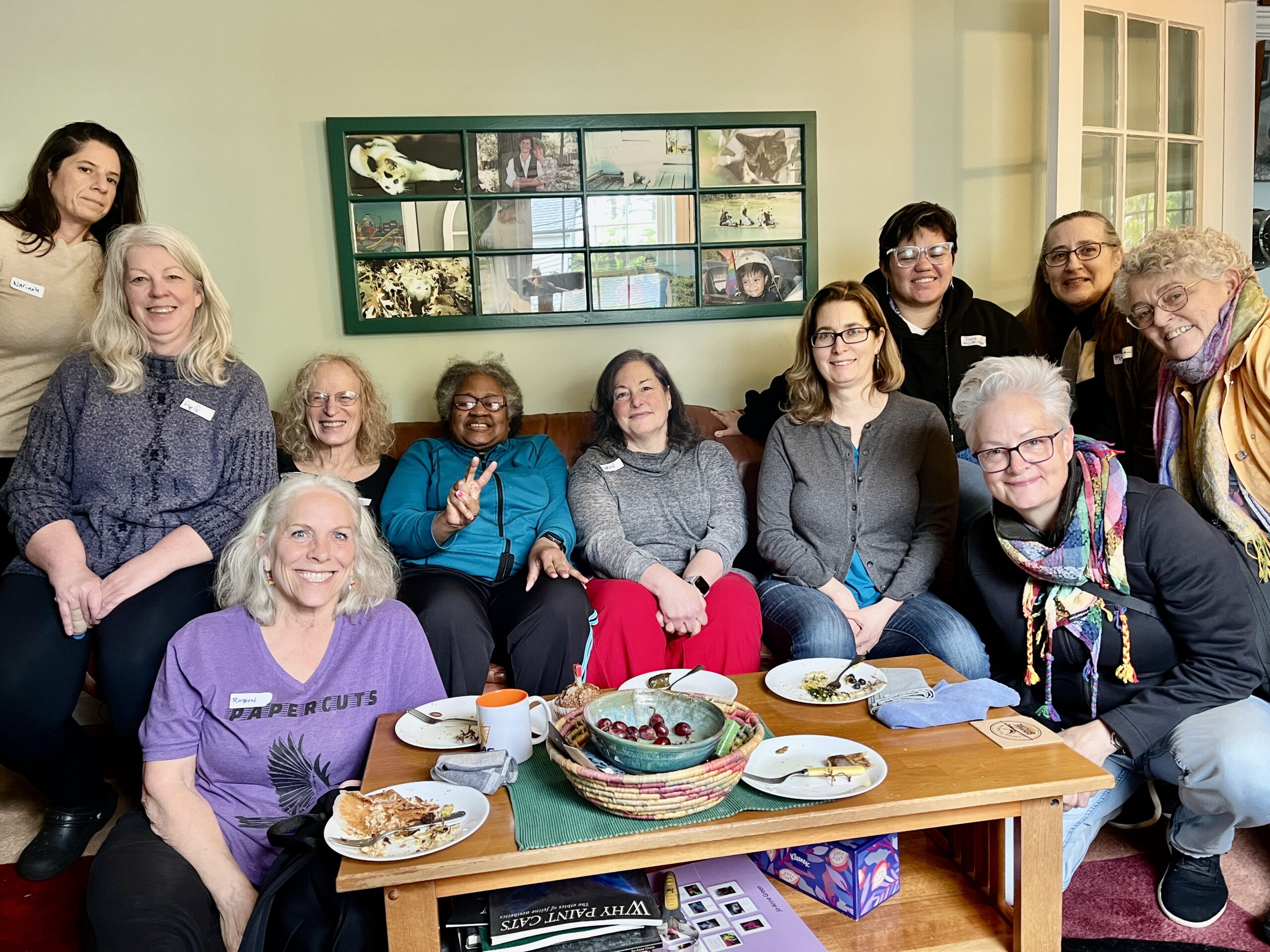“Are you connected to bi+ community? If yes, what form does it take, and how did you find it?” We posed this question. Here’s what folks had to say:
Laura Days, 46, Boston, Massachusetts, U.S.
This year, I intentionally sought out connection to the bi+ community. I originally came out in 1998 while I was in college and, at the time, I only knew one other bi+ person. I was somewhat involved in Miami University’s GLBA (MUGLBA), participating in panel discussions as “the bi person” and tying yarn around trees in the middle of the night for “Tie the Knot Day”—a way to promote marriage equality even before it was on Massachusetts’ legal radar. While I never felt strong ties to the MUGLBA, I felt that the other members recognized me as one of their own, which was sufficient for me at the time.
I came to the realization during the pandemic that over the past two decades I had essentially fallen back into the closet. Erasure and invisibility are a bitch, and when biphobia comes from within the queer community, it is especially stinging. I realized that my disconnection from the bi+ community was actively hurting me, so I made the decision to actively seek it out. (Even as recently as last summer, I only had one bi+ friend, who lives in another time zone.)
I reached out to the Bisexual Resource Center. I joined BLiSS and the Boston Bisexual Women’s Network. I emailed podcasters. And I slowly found events where I met other bi people. On a snowy Sunday in February, for the first time in my life, I found myself in a room where everyone there identified as some identity under the bi+ umbrella. The realization that I shared something so fundamental with everyone else in the room was overwhelming. I found the same situation at an informal get together at a food court and at a dance party for Imbibe a month later. And I’m slowly making friends. Finding community is a process. I originally sought to find it in the greater queer community, but I found that tailoring my search for connection within the bi+ community gives me the peaceful calm and feeling of inclusion that I struggled with before.
Gabriella Gioia, 38, Argentina/Berlin
I’m originally from Argentina, and I currently live in Berlin, Germany. I don’t have much contact with the bi+ community here, but I had the chance to meet members of BiBerlin e.V—a bi+ organization based in Berlin—and it was wonderful to connect with them. Even though the language barrier can be challenging at times, I loved meeting the group and learning what being bisexual means in this city.
I also have a few close bisexual friends, and we often share our struggles and joys. These conversations have been vital for me, as they create a space where I feel understood and supported.
Sarah Patterson, late 20s, Baltimore, MD, U.S.
Joining a college rugby team shaped me in so many ways. Over the past 10 years, I have empowered myself and stoked the flame of my adult identity, and I have participated in and witnessed so many blossomings. I started on a men’s team at 18 years old and I loved playing on other women’s teams in the tournaments so much that the next year, I started my own women’s team. I will never forget the crazy car rides, concussions, and clown car moments of stacking eight women in a six-seater vehicle just to go play a game in Boulder, Colorado on a Saturday. I have always said that women’s rugby is one of few safe havens that truly promotes and protects women and trans folk of all kinds. This remains true even with the constant political backlash and ire directed at women and trans people. Women’s rugby teams have become the catch-all for any person who comes to the sport seeking help, love, friendship and strength. While I rarely see a men’s rugby team take on trans players, I know that at least at the club level, anybody who shows up with an open mind and heart is welcome on the pitch.
On my current team and with many of my previous teams, there has always been some sort of involvement with the LGBTQ+ community. We always have a booth at Pride here in Annapolis, Maryland. We do this not only to promote the team, but also to show our presence and support for the community that gives us the ability to play. Without bi+ women, women’s rugby would be practically nonexistent. Through this rugby team, I am able to maintain my presence in the bi+ community by frequently meeting and recruiting others like me who were being pulled between so many boxes and labels and never accepted as themselves. It’s a miracle what learning that one can physically just knock someone over will do to the confidence of someone who has never known it was okay to just exist in the proverbial “middle.” The rugby team has never judged me, or anyone that has chosen to line up on the sideline with them.
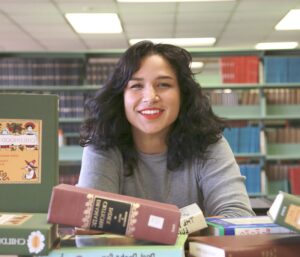
If you happen upon any women’s rugby team, you would be hard pressed to find one without queer players, trans or otherwise. Furthermore, it’s impossible to find a women’s rugby team not involved in the queer community and also their local community. The time I spent with my team allows me to have open and candid conversations with bi+ women. I may not be a wise old woman yet, but I do feel as though I have helped, changed or enhanced other young women’s perceptions of themselves just by teaching them how to tackle or how to run a good offense or make a good pass. I hope that I can continue to grow the sport and, through rugby, meet more people in need of a change in perspective.
Sarah Patterson is a candid creative currently living and writing in Baltimore, Maryland, in the U.S. She is the author of the poetry collection What Color Am I?, an analyst, and a proud rugby player on the Severn River Honey Badgers.
Heidi Bruins Green, 68, California, U.S.
My connection to the bi+ community is much less structured than it used to be. For many years, I participated in local, national, and international bi+ groups, attending and speaking at bi+ and queer conferences about scientific data and common sense about being bi+, bi+ erasure, bi+ fabulousness, and bi+ inclusion. I also spoke at companies, universities, and community events for years. I found community there, even though I was almost the only bi+ person in my regular life outside of my activism.
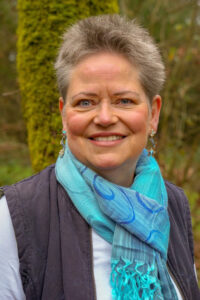
These days, many people I meet identify as bi+. I’m still an activist, but my focus is more on resisting the actions of the current United States federal administration, protecting the rights of marginalized people (especially trans people), finding my role in climate change awareness, and preparing for grandmotherhood. My life is littered with bi+ people (in a good way). Many of the people who are nearest and dearest to me are their own queer version of bi+. I call out bi erasure and biphobia whenever and wherever I see it—which still happens too frequently in the larger world. When I do, often one or more people chime in and say they are bi+. What is different these days is that, once reminded, people are immediately aware of what they missed and are more willing to suffer through the explanation of why it matters (which I give every time), because they have heard it enough times to know it’s true that bi+ is not included in “gay and trans.” The decades our people have spent insisting on bi+ inclusion have made a difference at the grassroots level, even though there is more to be done.
Kimberley Debus, 60, Takoma Park, Maryland, U.S.
Am I connected to bi+ community? No, and yes. No, I do not have a formal bi community that I call mine. That may be in part because I am a queer elder, and the places I would have found that kind of community in my young adulthood no longer suit me in my older middle age. But yes, being out as bisexual (and in my role as a Unitarian Universalist minister) means I meet other bi folk who are so glad to meet even one other bi person, and we become connected in a web of mutuality.
Rachel Finney, 25, Western Massachusetts, U.S.
As someone who works from home, completely in my own bubble, and never having learned how to build friendships outside the walls of a school or office, it’s been hard for me to remain involved in any social community, let alone the bi+ one. But the opportunity I received last year to moderate Bi Women Quarterly’s Reddit page has given me not just a way to give back to a publication I love, but to connect myself with bi+ and queer people across the internet. Playing a role in this community helps me feel united to others despite my solitude.
Additionally, this role allows me to take a small part in the actions which support our community. It can be draining at times to wade through the pain, stress, and anger many of us currently face as queer people; certainly, not all social media engagement is rewarding. But even when my energy to engage with these issues critically is low, I make a dedicated effort every week to participate in some small but meaningful way: congratulating a member of the community for their coming out post, reposting resources and inspiration to our page, or sharing info about BWQ’s issues (new and old), attending meetups, and calls for submission to those who may benefit from what we do. I’ve found that even in a time when scrolling through social media can be deeply disheartening, the connections, support, and sense of community we can foster online are stronger than the hate we may encounter.
Bi Women Quarterly is on Reddit at: www.reddit.com/r/BiWomenQuarterly.
Avery Friend, 33, Maine, USA
I’m deeply immersed in the broader queer community, which includes many bi+ people! I discovered my own bisexuality and queerness as a teenager through online communities, usually bi and queer people given my upbringing in a conservative community in the deep south. Upon moving to a more progressive state, it was much easier to find and connect with folks in local spaces, through more progressive state, it was much easier to find and connect with folks in local spaces, through clubs, events, etc., as well as through volunteer work with a local organization dedicated to supporting and advocating for the broader queer community. There are so many bi+ people in these spaces, and it’s wonderful to connect! I’m also really involved in the world of sapphic romance and literature, starting as a reader and active reviewer. Through that, I’ve formed deep relationships and friendships and now often serve as an editor; in these spaces in particular I make a concentrated effort, along with fellow bi+ community members, to highlight and make spaces for bi+ women and nonbinary folks to be welcomed and represented in meaningful ways.
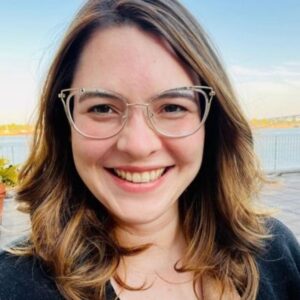
Finally, I try to be really visible both in real life and online! I’ve got pins, stickers, and apparel showcasing the bi+ flag, puns, etc., and I decorate my spaces and even my bags and water bottle with indicators that I’m bi+ and symbols that represent queerness more generally. These showcase identities that I’m proud of and are essential parts of my life, indicate that I strive to be a safe person to be around for other bi+/queer folks, and often serve as conversation starters. Sharing and posting about my own bisexuality, my role as an assistant editor of Bi Women Quarterly, and news, memes, etc. related to bisexuality online is another way to be visible and create connections.
Casey Lawrence, 30, Gothenburg, Sweden
For as long as I can remember, my connection to bi+ people has always been online. Some communities started on message boards back in the AOL and MSN messenger days; many have changed form or fizzled out over the years. My most recent community—the one I’d like to highlight here—is the Bi+ Book Gang, started by author Bailey Merlin during the pandemic.
The Bi+ Book Gang is a group of bisexual (and pansexual, omnisexual, etc.) writers and creatives from all over the world who have come together for community, support, growth, education, and critique. Our Discord server hosts a number of active channels by genre and interest groups, where we chat about our projects (and our lives outside of our work, too). We share in each other’s accomplishments and trade drafts for critique. We have regular, drop-in Zoom meetings that can be social or progress-focused, like our accountability sessions (where we meet for an hour to write together in silence over Zoom—more motivating than it sounds!) or periodic writing workshops.
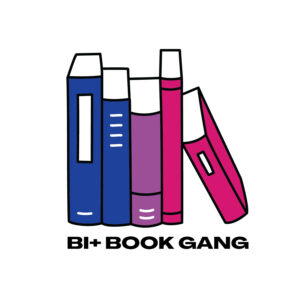
Bi+ writers of all levels—aspiring novelists, amateur bloggers, accomplished nonfiction writers, academics, poets, and more—are welcome to join the group. You can sign up for the newsletter on Substack (biplusbookgang.substack.com/) or join Discord to chat with other bi+ creatives by applying at sites.google.com/biplusbookgang.com/bpbg/home. This group has become like a family to me, and I hope we can continue growing this supportive bi+ writer community and add new features and activities like anthologies, in-person meet-ups, writing conferences, and whatever else we can think of.
Loraine Hutchins, 77, Washington, DC, U.S.
In a way, I’m very connected to the bi community, via the internet and phone. Yet in a way, I’m not, and feel terribly isolated and alone. I live with these contradictions pretty easily, ha ha, being so bi, but not bifurcated.
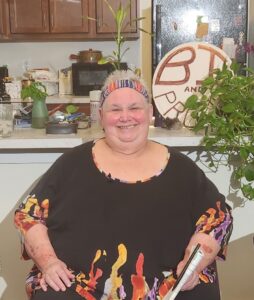
Nicola Koper, 50s, British Columbia, Canada
I’m connected to bi+ and pan folks mostly through the queer community I’m involved with. I’m based in a small town in northern British Columbia, Canada, and there just aren’t enough queer folks to break down into more refined groups. So we welcome anyone who identifies as queer, trans, nonbinary, bi and pan, gay or lesbian, or anything else. Mostly I would say this is positive—we have an amazing, welcoming, and supportive community. I think there can be a risk in these broader spaces that bi+ folks “don’t feel queer enough to earn their place” in the queer community; I think there are two reasons why it works well here. First, one of the first things a community member commented on to me was, “We’re just finding our way—a lot of us are struggling with whether we’re queer enough to call ourselves queer,” so that was really validating. A lot of folks have nonbinary identities or sexualities. The other thing is that we have at least monthly social get-togethers, and there are a lot of straight-passing couples who attend and help to normalize the message that you can be bi+ and married to someone who has a different gender.
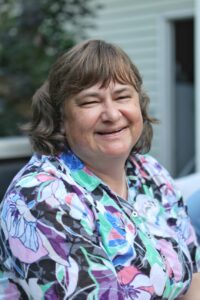
Virtual meetups were totally essential to me when I first explored my bi+ identity. It let me meet other bi people and normalized that identity for me. It also led me to some online resources that helped me get over my internalized biphobia. That gave me the confidence to reach out to new queer communities in person, and now I’m grateful for my in-person queer friends; virtual groups don’t give you the chance to hang out, have lunch, and get to know people in the same way. So, in my experience, virtual groups and in-person communities are both totally important, and can’t replace each other.
Jennifer Taub, Boston, Massachusetts, U.S.
I’m not particularly connected to bi+ community. It used to feel very important to me, as I felt invisible and not “legitimate” within the queer community (which for many years was the “gay and lesbian community”). Organizations had the G and the L but not the B (or the T). We were supposed to assume inclusion, but it felt marginalizing.
For many years I have been partnered with men, which also has obscured my bisexuality.
In more recent years, the queer umbrella has opened more widely. I do not think bisexuality is viewed as negatively as it used to be. I have especially found that younger people— in their 20s and 30s—tend to be more accepting generally of the nonbinary. The idea that a person can be attracted to more than one gender is more accepted and not judged as negatively.
Having more relationships with both men and women in my history also has allowed me to feel more confident in my identity.
It’s incredibly important to me to have queer community in my life. One place I have found that is Camp Camp, which is a summer camp for queer folks and also a nice community who have accepted me—and my straight partner. I’m in a queer kickball league. But as for bi-specific communities—I don’t really have any at present.
Jane Barnes, 81, Staten Island, New York, U.S.
I’m connected to the lesbian community as they have archived my papers (25 boxes). If there were a bi one, I’d go there. I’m not otherwise connected at all except for Bi Women Quarterly. The Lesbian Herstory Archives took my papers a decade ago. They were all sweet young dykes and perhaps were some bi? I don’t know. When I identify as LGBT, do people get I’m bi?
I’m 81 and people ask if I’ve been married. I say I’ve had five partners, three men and two women. That stops them.
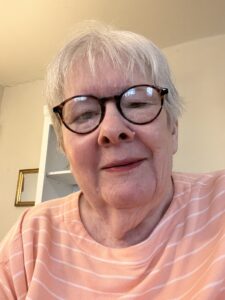
Anna Kochetkova, 30s, New South Wales, Australia
As a founder of Sydney Bi+ Social Club, I ended up creating space which would attract other bi+ people. I had felt like the only bisexual on the planet, so I went ahead and created my first event for bi+ people (never expecting anyone to show up). To my surprise, people came. And just like that, I wasn’t the only bisexual. Since then, I moved out of Sydney and now live rurally, with very few queers around. Moreover, I live in the forests of Yeagl People, in Northern NSW, where I am yet again the only bisexual I know. But not entirely. My Sydney events continue to take place, thanks to four amazing volunteers who are helping us make it all happen. And I met a handful of country queers who have become my core circle of queer support and love. I don’t feel as connected to the community anymore, but I also feel like a rightful member of the community which didn’t feel mine until I flung myself into it and took half a decade learning to accept and love myself and people around me. Today, it’s my solitude that helps me feel more connected to my people. I send them my virtual love and continue putting on events I never get to attend. We remain connected in my heart.
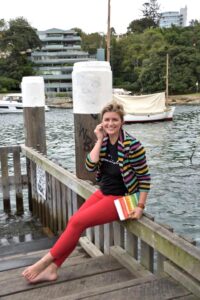
Maia Brown-Jackson, early 30s, U.S.
I’m incredibly lucky to have a fantastic queer community of friends that I sort of fell into sideways. My best friend knew she was bi long before I did (I was honestly so focused on getting straight As in school that I didn’t give dating much thought until after college) and she and a few of her close, also queer, friends all moved to the same city after college. I wound up here as well about two years ago, and while I was acquainted with everyone, this was my first opportunity to develop deeper friendships with them. Then I decided to expand this by starting a book club, via Lex (a social app fr the LGBTQ+ community), and those who were actually interested in sticking around for the book club part of book club were enfolded into this community. And now that I regularly do poetry readings, I’m expanding it further still with the awesome people I meet at readings. Because, as I’ll explain, having this community has been so transformative for me, I want to offer a safe place to the people who haven’t found one yet.
One thing the piece I recently wrote for Bi Women Quarterly touched on was not feeling like I have a home, because past trauma made my very skin feel unsafe, a thing I carry that with me wherever I go, and it lost me the girl I used to be, so now her home, her safe place, is no longer mine. Thus, I’ve spent my years running. This apartment I live in now, this is the first place where I’ve ever renewed my lease. And it’s not because of the massive windows and gorgeous view: this is the first place I’ve lived where I’ve had a community. I didn’t realize before how much impact that could have on your life—having people to celebrate and commiserate and, yes, discuss weird literature at length with. How much it would mean to start accepting that people wanted me in their lives for me, and wanted me to be happy, and were kind and genuine and open. It started healing a piece of me that I didn’t realize had been so badly damaged. Having this queer community, where I know I am accepted, all of my quirks and oddnesses and trust issues and identity itself, has helped me finally slow down.
Where do YOU find community? If you haven’t yet found the connections you would like to have in your life, please consider taking action to create the community and connections you wish you had.
Featured Image: Boston Bisexual Women’s Network’s May brunch at Robyn’s home.

